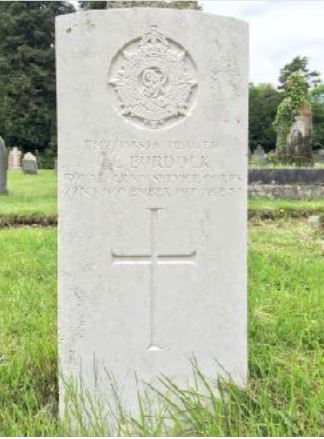645th Mechanical Transport Company, Royal Army Service Corps

Frank Elliott Burdock was one of five children born to Walter Henry and Caroline Burdock of Painswick. Walter’s father had started the building/plumbing/ decorating business of Burdock & Sons in 1832 and both Walter and Frank carried on the business which marked its 150th anniversary in 1982.
It is believed that Frank was born in 1884 but was not baptised until 20 November 1887 at the parish church.
There are a great many entries for Frank in the British Newspaper Archive. He was clearly a talented youngster with the first mention as early as 1900. He is reported in amateur concerts and dramas and was a part of Painswick Lyric Quartet in 1905. He was playing solo cornet in 1906.
Frank seemed to be much in demand for his singing and there are numerous reports of him singing at the beginning of civic and parliamentary meetings. In 1912 he performed at the Holloway Institute at Stroud where he was described as being the ‘possessor of a rich rolling bass voice’.
In 1910 both Frank and his father Walter, played cricket for Painswick and Frank played bowls. Frank is listed in local directories of 1910 and 1914 as being the Deputy Registrar of Births and Deaths for Painswick sub district of the Stroud Union.
Walter Burdock appears to have been Captain of Painswick Fire Brigade for some years and Frank joined him in the brigade. In 1915, Frank was a pall bearer at the funeral of fellow fire fighter and soldier, Richard Hanks.
On 21 July 1909, Frank married Annie Elizabeth Berry, daughter of a local farmer. Their only child, Lucy Olive had been born on 2 July of that year.
The 1911 Census shows the family living at Stamages, Painswick.
Frank’s service records have survived. He attested on 4 December 1915 aged 32 and was appointed to the Motor Transport Section of the Army Service Corps on 10 May 1916 at Grove Park, south east London and passed his ‘Learner’s Test’ on 5 August 1916. He left for Boulogne in August 1916 to join the British Expeditionary Force.
There is a graphic, comprehensive account of Frank’s final illness. He was driving a lorry at Rousbrugge, Poperinge on 23 October 1917 when he was taken ill with stomach pains, facial swelling and shortness of breath. He was taken to the Casualty Clearing Station for one night then transferred to Abbeville. He was there for two weeks then transferred to the Military Hospital City of London at Clapton on 13 November 1917. Acute nephritis (inflammation of a kidney) was diagnosed. His condition deteriorated and he died at 11pm on 22 November 1917; he was 34 years old. There is correspondence between Frank’s widow and the army officials with regard to his personal effects and details of his funeral. He was buried at Painswick Cemetery on 24 November 1917 and has a CWGC headstone. He is commemorated on the Painswick War Memorial.
The Stroud News and Journal of 30 November 1917 carried the following report: The funeral of poor Toby Burdock was one of the most impressive I have ever attended. The unexpectedness of his death emphasised the regret felt by and the sympathy for the young widow. It is many years since the fine old parish church has contained so large and so thoroughly representative a congregation. Truly Pte Burdock was in every sense not only a soldier but a man. He was very popular among a wide circle of friends, and by old and young alike he was esteemed because of his geniality, his boyish freedom, and his integrity. The right-hand man of his father in the building business for so many years conducted in the parish under the style of Burdock & Son, it was only the fact of the loss his father would feel at his absence that led him to hesitate at all about joining up, and when he finally decided the course to take he settled down easily to soldiering and took a very keen interest in his work. He contracted the illness which has proved fatal on the battlefields of France, and the only consolation is that his remains lie buried in the village cemetery, near the home of himself and his forebears.
Annie was awarded a pension of 20s 5d per week from 27 May 1918. She was awarded probate on 2 February 1918, Frank’s estate being valued at £536 (equivalent to £35,000 today).
Annie remarried in 1932. Her husband being Herbert Chandler. Annie’s death on 5 April 1939 was reported in The Citizen of 8 April that year. It stated that she was previously married to Frank Burdock but was living in Accra on the Gold Coast (now Ghana) where her husband Lieutenant Colonel Chandler was Deputy Controller of Customs and Excise. They had married in 1932. She had made several visits to Painswick in the intervening years and there was to be a memorial service in Painswick. Her daughter was Mrs F J Collett who still lived in the village. Lucy had married Francis Collett in 1932. Lucy remained living in Painswick and died there in 1987.
Researched by Helen Wollington 6 May 2018
